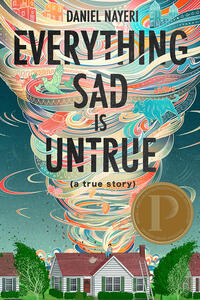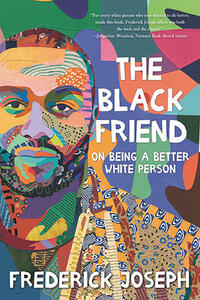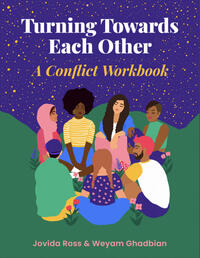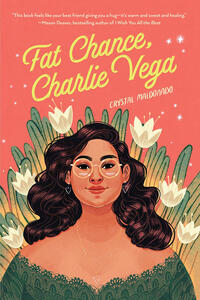
In Eyes That Kiss in the Corners, written by Joanna Ho and illustrated by Dung Ho, we learn about a child from an East Asian family who recognizes that her eyes are different from the eyes of the other children around her—and those differences are just fine! Unlike her peers, the protagonist’s eyes “kiss in the corners and glow like warm tea,” just like the eyes of her mama, amah and sister. With a sweet departure from identity-affirming books rooted in struggle, this one simply celebrates, and that’s a beautiful thing.
ELEMENTARY SCHOOL
No existential crisis here—just heart-warming self-love and family pride.
— Monita K. Bell, Learning for Justice Managing Editor

In Daniel Nayeri’s Everything Sad Is Untrue (A True Story), narrator Khosrou presents himself as a middle-school avatar of Scheherazade—a figure of Persian legend who told stories to spare her life. For Khosrou, a refugee born in Iran and now living in Oklahoma, sparing his life means holding onto his culture and memories. Khosrou interweaves legends, family histories and often painful, present realities. These stories poignantly illustrate the importance of reclaiming hidden histories and the hurt experienced by students whose truth is discarded—or worse, erased.
MIDDLE AND HIGH SCHOOL
A gorgeously written book that prizes imagination, reclaims truth and rightly demands love for students who feel far from home or forgotten.
— Cory Collins, Learning for Justice Senior Writer

Beyond Survival: Strategies and Stories From the Transformative Justice Movement, edited by Ejeris Dixon and Leah Lakshmi Piepzna-Samarasinha, is a vital resource that helps readers more deeply understand transformative justice and learn practical ideas for implementing it in their own communities. The collection of essays provides an intimate look into what has and hasn’t worked in diverse communities across the country.
PROFESSIONAL DEVELOPMENT
A must-have resource for any educator striving to co-create a thriving community.
— Hoyt J. Phillips III, Learning for Justice Deputy Director of Teaching and Learning

Shinsuke Yoshitake’s relatable story follows a girl whose brother tells her the future is doomed in There Must Be More Than That! Fearing the destruction of Earth, she is comforted by her grandmother, who assures her that there are always more possibilities than we are aware of at any given movement. Gentle, lighthearted and honest, this story is sure to captivate young readers and provide ample space to discuss the future that we want to be a part of and steps we should take to get there.
ELEMENTARY SCHOOL
Subverts the notion of either-or thinking in a way that is accessible and engaging for young students.
— Christina Noyes, Former Learning for Justice Fellow

In The Black Friend: On Being a Better White Person, Frederick Joseph shares stories from his own life to help white readers understand how race-related issues have affected him and continue to affect him as a Black man—and what readers can learn from those moments. With his infectious sense of humor and guiding hand, and with help from interviews with several artists and activists, Joseph assembles a necessary toolkit to help readers become stronger accomplices in the fight for racial justice.
MIDDLE AND HIGH SCHOOL
Joseph allows a glimpse into his experiences and helps white people to do better as a result—we should all be so lucky to have a friend like that.
— Colin Campbell, Learning for Justice New Media Associate

Jovida Ross and Weyam Ghadbian’s Turning Towards Each Other: A Conflict Workbook is a transformational resource for any group engaged in social-change work. A collection of personal and group explorations grounded in embodied practices, Turning Towards Each Other guides us in examining what’s underneath our habitual responses to conflict and their connection to oppressive structures we are so tirelessly working to upend. A critical resource for beginning to shift the ways we interact with conflict and each other.
PROFESSIONAL DEVELOPMENT
Makes clear the pivotal connection between our inner work and collective liberation.
— Christina Noyes, Former Learning for Justice Fellow

Daddy Why Am I Brown? A Healthy Conversation About Skin Color and Family celebrates the rich tapestry of human phenotypes, offering a thoughtful guide on discussing skin tones with kids. While skin color may offer clues about where a person’s ancestors came from, we must get to know people to learn anything about their behaviors or background. Written by Bedford Palmer II, Ph.D., and illustrated by Winda Mulyasari, this book emphasizes the joys and rewards of taking the time to do that work. Pick up this book for an accessible conversation starter.
ELEMENTARY SCHOOL
A great guide for helping students understand the differences among race, skin color, ethnicity and culture.
— Jey Ehrenhalt, Learning for Justice School Programs Coordinator

Crystal Maldonado weaves a wonderfully sweet, emotional and funny story about love, friendship and family in Fat Chance, Charlie Vega. Charlie is a Brown girl who loves her fat body even when things around her—including her own comparisons to her charismatic best friend—suggest her physical self needs transformation. Charlie is beautiful, charming and delightful with a measure of self-doubt, all attributes that inform her journey as she winds her way through the twists and turns of adolescence.
MIDDLE AND HIGH SCHOOL
Beautifully and authentically captures nuanced relationships and what it feels like to navigate self-acceptance.
— Lindsey Shelton, Learning for Justice Marketing Coordinator